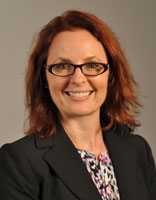As a Weekend Executive MBA student, I have to be honest that I was not particularly looking forward to spending two straight weeks on campus. The format I was used to was Friday/Saturday classes and back to life for two weeks until time for residency again. I’m local to the Triangle, so I had the option of going home at night, but I knew that the days would be long so it was logistically easier to stay on campus. Basically, I moved in—coffee accouterments, yoga mat and all. Elective Term is the first time that the all Executive MBA classes came together, so I didn’t want to miss opportunities to meet new classmates. There are some growing pains and a bit of healthy competition between the classes, but you quickly realize that everyone has something to enrich your learning and life experience.
Executive HSM students are required to take a distance seminar course with Dr. Peter Ubel that culminates with an in-person class the Friday before Elective Term begins. Prior to this Friday class, Dr. Ubel arranged for teams to engage with an executive at various health care companies to prepare for roundtable interviews in the last in-person meeting. My team consisted of students from all three Executive MBA programs, most of whom already had extensive experience in health care. We were encouraged to dig deep and ask tough questions about their companies and/or industries, and there was a lot of great discussion from the entire class for each executive. This is the first time that many folks meet their HSM teammates from other programs face-to-face.
There are three HSM-specific electives during Elective Term. Health Care Markets (HLTHMGMT 711) is required for all students pursuing the certificate. I also chose to take Life Science Product Strategy (HLTHMGMT 718). As luck would have it, both classes were in the first week, both were taught by Dr. David Ridley, and I had the same team for both classes. When I first started considering electives, I didn’t realize how much easier this would make that first week (although I found it challenging to remember which assignments were due for which class).
Since the Health Care Markets class is required, it was a larger class with about 30 people with a wide variety of professional backgrounds including, IT, finance, and consulting, not to mention the various health care background represented. Many of the non-health care students just wanted to learn more about the U.S. health care system and were not part of HSM. The class had great discussions about various topics covered including health care systems in other countries, the payer space—both government and private insurers, employer health benefits and how those affect both employees and employers, the components of managed care, hospital strategy, health IT, pharmaceutical pricing, and recent changes in the U.S. health system. Having such diversity of backgrounds and experiences among classmates made for really great discussions.
A subset of those same classmates also took Life Science Product Strategy. Since it is an HSM specific elective, the class had only about 13 students. This allowed for a more conversational atmosphere in class that I really enjoyed. In this course we covered topics pertaining to drug development and the approval processes in the U.S. and other countries, global health issues, drug patents and lifespans, the medical device space, marketing of pharmaceuticals, and the life cycle management of drugs. What I think I appreciated most about Dr. Ridley’s style for both classes is that, while we had readings and questions to answer for the next day’s class, there was nothing to turn in during the week. It took a lot of pressure off an already very hectic week and I could relax a bit and enjoy the process of learning more.
The second week offered Health Care Provider Strategy (HLTHMGMT 714). I chose not to take this class and instead dive into a topic I knew virtually nothing about—Private Equity and Venture Capital (FINANCE660). I was slightly terrified to sign up for this class since this is not at all my background, but this class is incredibly relevant to the health care space, and is completely fascinating. Dr. David Robinson is top notch and does a fantastic job making the topics accessible for those of us without finance backgrounds. It almost makes me wish I did have a finance background—but not quite.
Finally, I also took Strategy Implementation (STRATEGY841). Executive MBA students do not have the ability to pursue multiple concentrations/certificates, so my idea was to take classes that would ostensibly fulfill a strategy concentration while pursuing the HSM certification. Dr. Chuck Bamford taught this course, and his enthusiasm for the topic was on full display every day.
Elective Term is the last time you are with your classmates until graduation, and there is a great closing dinner with your particular program that is a lot of fun. While my entire experience at Fuqua and in the HSM program will be memorable for a long time to come, I know Elective Term will stand out in my mind as one of the most interesting and rewa

